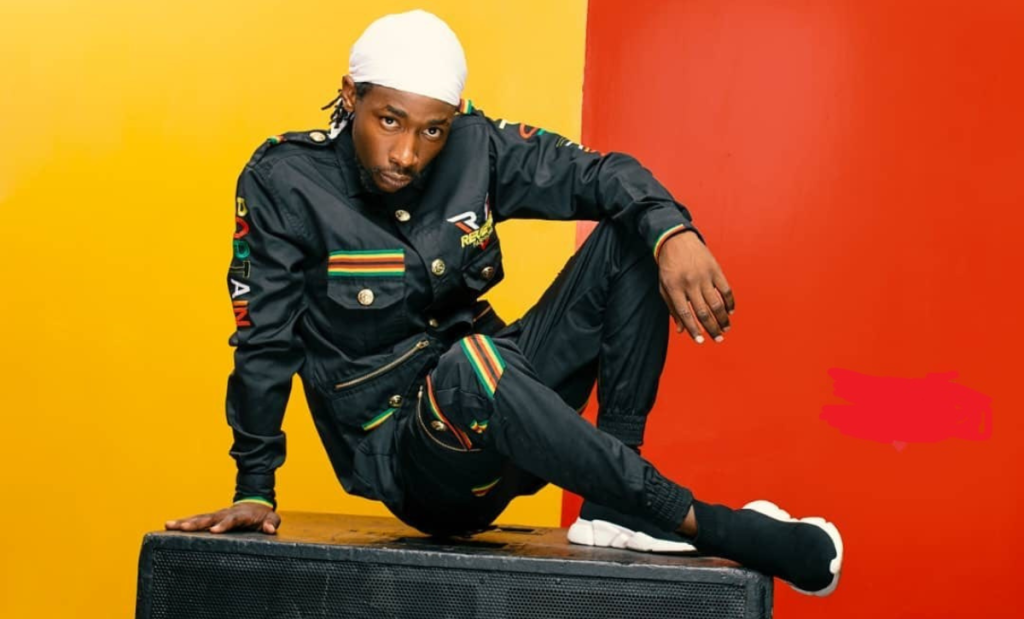Poptain Got the Right Mix
Born Ameen Abduljaleel Matanga in Gweru on May 22, 1994, Poptain may not yet be shoulder-to-shoulder with his new school peers in terms of numbers, but that has more to do with the intellectual demands his music places on listeners. His agile patois delivery does not allow the listener to get it all in one play and some of the lyrics are to be digested rather than simply enjoyed.

Zimdancehall newest star, Poptain, brings to the craft a mix of social consciousness, intricate wordplay, effortless cadence and casual patois fluency. The animated lyric video for his latest single, Freedom, may belatedly bring music lovers up to speed with his song writing abilities, but the underrated chanter has been ably grinding underground for half a decade now, with no less than 100 tunes on his discography.
While the animation itself is not exactly high-concept — somewhat lacking in life-like coordination and narrative layers — it is an ambitious take and its real value is the invitation to follow Poptain’s emotive, but somewhat demanding punchlines in real time. I had already bumped into the track on repeat myself, but when I watched the lyrics, it dawned on me just how much had sailed beneath my radar.
With a hook like: “Me never free no, no at all/ Yatinowana ndoinonzi freedoom (a clever play on ‘freedom’ and ‘doom’), breda…/ Although dem claim seh we born free” — rhymes revolving around the corruption and the breakdown of social services poisoning the ghetto condition in Zimbabwe and the versatile angles for blending into the sonic landscape — Poptain’s new track is a serious case for inducting him into the conversation about the best conscious artiste in Zimdancehall at the moment.
Born Ameen Abduljaleel Matanga in Gweru on May 22, 1994, Poptain may not yet be shoulder-to-shoulder with his new school peers in terms of numbers, but that has more to do with the intellectual demands his music places on listeners. His agile patois delivery does not allow the listener to get it all in one play and some of the lyrics are to be digested rather than simply enjoyed.
He has paid his dues and is growing through the ranks. He has convincingly mastered the dancehall greats and sharpened his own unique delivery over the years.
“Over the years, I have been doing a lot of covers of various international artistes, but due to reasons beyond my control, I could not come out in the open (and) freely showcase my hidden talents,” Poptain told Soundtrack.
“However, my major inspirations were Mavado, Richie Spice and Blak Ryno, only to mention a few. It was only after a close friend encouraged me to start writing my own songs that I started ghost-writing for other artistes.”
The recording of his first single, like many art stories, was an accident. A friend whom he had written a song for could not deliver so the then 18-year-old Matanga had to step up to the microphone. Since 2012, he has been evolving into an artiste who does not merely belong to a wave, but one that can stand on his own.
Whereas some dismissed Zimdancehall as a seasonal wave, new energy keeps entering the conversation. From the Mangoma Depot and Bodyslam streams of 2013 and 2014, to Blot, Jah Signal, Boom Berto, and now Nutty O, Enzo Ishall and Uncle Epatan, the game is open-ended and Poptain complicates it with a versatile skills set.
“It is not a lie that the wave was going a bit low, but us as dancehall lovers and as youths with unexplored talent, we took it upon ourselves to revamp the scene and we are fortunate enough that Chillspot Records (resourcefully manned by DJ Fantan and Levels) is supporting the movement. Dancehall is back on top again and am proud to be part of the new generation evolving the genre,” Poptain said.
“People are welcoming us everywhere we perform. They know who we are, which is a good development because artistes we looked up to seem to have fallen behind,” the ‘yut-man’ told Soundtrack.
His assumed name, Poptain, is an accident like his first single. “The name came about because of a friend who suggested that I go with the stage name Poptone, although it didn’t sound cool enough. Another friend mispronounced it as ‘Poptain’, which sounded more comfortable,” he recounted.
If he varies the conscious tip with radio hits and a more Zimbabweanised dancehall style that does not overwhelm the listener with demands for interpretation, the name Poptain may as well come to mean Captain of Pop.
Poptain, however, feels at home on the conscious turf. “I prefer consciousness over popularity in and of itself. What I stand for is what matters to me. Music is not just business to me. It is a platform to express my true self.”
As a matter of fact, his lighter tracks like Party Kumatapi, Chuku Cheke and Kwatobva fit the “music about music” bill but the deeply considered messages of upliftment in Freedom, Life Haivakwe Nemashoko and Takes Time will earn him a spot comparable to prophets like Bugle and I-Octane.



Leave a Reply